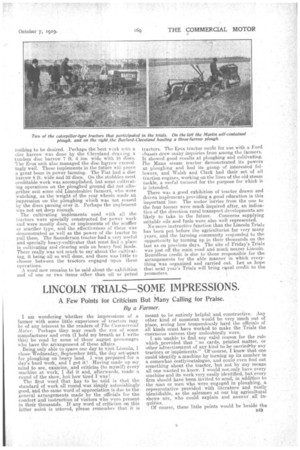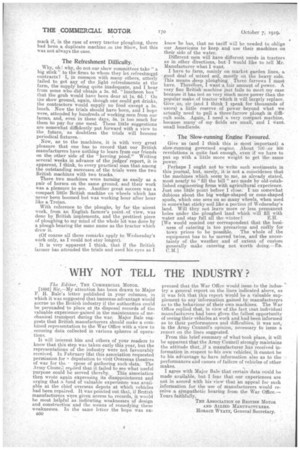LINCOLN TRIALS SOME IMPRESSIONS.
Page 21

Page 22

If you've noticed an error in this article please click here to report it so we can fix it.
A Few Points for Criticism But Many Calling for Praise. By a Farmer.
I am wondering whether the impressions of a farmer , with some little experience of tractors may be of any interest to the readers of The Commercial Motor. Perhaps they may reach the eye of some. manufacturer and even (I hold my breath as I write this) he read by some of those august personages who have the arrangement of these affairs.
Being only able to spare one day to visit Lincoln, I chose Wednesday, September 24th, the day set;apart for ploughing on heavy land. I was prepared for a day's hard work, and I got it! .Having mach. up my, mind to see, examine. and criticise (to myself) every machine at work, I did it and, afterwards, made a round of the show, but haw tired I was!
The first ward that has to be said is that the: standard of work all round was simply astonishingly, good, and the same word of appreciation is due ta the general arrangements made by the officials for thecomfort mid 'instruction of visitors who were present in their thousands. If any Ward of criticism. on this latter point is uttered, please remember that itis
meant to be entirely helpful and, constructive. Any other kind of comment would be very much out of place, seeing how tremendously hard the officials of all kinds must have worked to make. the .Trials the enormous -success they undoubtedly were.
L aim unable ta find any valid reason for the rule which,, provided that ".no cards, printed, matter, or other advertisement of any -kind to bemrriedsby any tractors or implements." Of-course, I know that one could identify amachine by turning up its number in a. somewhat oastlyeatalog-ue, and could even find out something about the tractor, but not by any moans all one w.a.nted to know. I would notsonly have every machine and its work very easily identified, butevery. fixra should have beninvited, to bend, in addition to the man or men • who weresengaged in ploughing, a representative. provided with literature and easily identifiable, as the salesmen, at Our big agricultural 010.1Ns are, who could explain and answer . all inquirks. Of course, these little Points would be beside the B49
mark if, in the case of every tractor ploughing, there had been a duplicate machine in the show, but this was not always the case.
The Refreshment Difficulty.
Why, oh! why, do not our show committees take " a big stick" to the firms to whom they let refreshment contracts? I, in common with many others, utterly failed to get any of the light refreshments at the farm, the supply being quite inadequate, and I hear from some who did obtain a 3s. 6d. "luncheon box" that the grub would have been dear at. is. 6d. ! On the show ground, again, though one could get drinks, the contractors would supply no food except a 5s. lunch. Now the trials should have been, and I hope were, attended by hundreds of working men from our farms, and, even in these days, 5s. is too much for them to pay for one meal. These little suggestions are somewhat diffidently -put forward with a view to the future, as doubtless the trials will be,come periodical fixtures.
Now, aa to the machines, it is with very great pleasure that one has to record that our British manufacturers have nothing to learn from our friends on the other side of the "herring pond." Writing several weeks in advance of the judges' report, it is apparent, I think, to every practical man that among the outstanding successes of the trials were the two British machines with two tracks.
There two machines. were turning as easily as a pair of horses on the same ground, and their work was a pleasure to see. Another great success was a compact little British machine on wheels which has 'never been boomed but was working hour after hour like a. Trojan.
With reference to, the ploughs, by far the nicest work, from an English farmer's point. of view, was done by British implements, and the prettiest piece of ploughing to my mind of the whole lot was done by a plough bearing the same name as. the. tractor which
drew it. •
(Of course all these remarks apply to Wednesday's work only, as I -could not stay longer).
It is very apparent I think, that if the British farmer has attended the trials and used his eyes as I know he has, that no tariff will be needed to oblige our Americans to keep and use their machines on their side of the water.
Different men will have different needs in tractors as in other directions, but I would like to tell Mr. Manufacturer what I want.
I have to farm, mainly on market garden lines, a good deal of mixed soil, mostly on ihe heavy side. This means • deep ploughing. . Three furrows I must have. Therefore, I want a fair amount of power. A very fine British' machinejust fails to meet my case because it has not so very much more power than the popular make of tractor which it will largely replace. Give us, sir (and I think I speak for thousands of users) a little reserve of power beyond what we actually need to pull a three-furrow plough in difficult soils. Again, I need a very compact machine, because many of my fields are small, and I want. small headlands.
The -Slow-running Engine Favoured.
Give us (and I think this is most important) a slow-running governed engine. About 700 or 800 revolutions is quite fast enough, even if we have to put up with a little more weight. to get the same power.
Perhaps I ought not to write such sentiments in this journal, but, surely„ it. is not a coincidence that the machines which seem to me, as already stated, most nearly to "fill the bill" are-made by old-established engineering firms with agricultural experience. Just one little point before I close. I am somewhat dubious about the big wedge-shaped or cone-shaped spuds, which one sees on so many wheels, when used in somewhat sticky soil like a portion of Wednesday's land. Will they not leave more or less permanent holes under the ploughed land which will fill with water and stay full all the -winter? E. H. We would remind our correspondent that the business of catering is too precarious and cOilly for town prices to be possible. The whole 'of ,the eiripment has to be moved twice, and the uncertainty of the weather and of extent of custom generally make catering not worth doing.-En. C. M.]
























